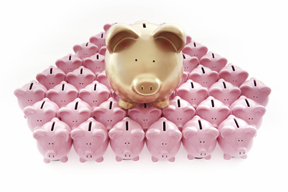It is always important to teach yourself, others around you, and even your children the importance of the difference between a want and a need. Impulse purchases can often seem like needs when they are actually a want. Learning how to identify the difference and avoid buying something that you really don't need and probably won't use that often, can make a huge difference in your finances. Here are some tips to make sure you are avoiding impulse purchases.
Latest Blog Posts
Topics: Managing Your Money, Saving for the Future, advice for members, Saving Money
Everyone has some sort of New Years resolution to make themselves a better person in the upcoming year. Those resolutions don't have to be limited to just working out and eating healthier, but they can also be committed to better managing your finances as well. Here are some helpful tips and tricks to make sure you stay on top of your finances in 2019:
Topics: Managing Your Money, Saving for the Future, advice for members, Saving Money, Holiday Advice
The word "budget" usually evokes a few words with negative connotations in many people's minds; words like can't and don't, as in "You can't eat out" or "You don't have funds available for those new shoes". But, all a budget really is, is a plan for how much money you will spend this month or this week. That's it. That doesn't sound too terrible, does it?
Of course, if you have been spending more than you can afford or you are setting a new savings goal, then setting a budget may come with a few constraints.
But, the most difficult part of preparing a budget is remembering every expense you incur each month; although, with the help of online banking and credit card statements, it's not really as hard as you think it is. Here are a few basic expenses that most of us incur:
• Mortgage/Rent
• Utilities
• Home/renters insurance
• Car payment
• Auto insurance
• Phone bill (land lines & mobile)
• Cable/Internet bill
• Credit card payments
You might also have some less common, but recurring expenses like a gym membership or student loan payments to consider.
And then, there are a few other expenses that are sometimes difficult to estimate but should still be part of your budget. Such expenses are:
• Gas
• Groceries
• Clothing/Shoes
• Entertainment
(movie tickets, Netflix subscription, dining out, video games, etc.)
Honesty is the best policy on these items. It doesn't really help your efforts to save if you tell yourself that you spend $25 per week on entertainment, when in actuality it's closer to $60. Get a true assessment over three or four weeks on your gas, groceries, shopping (clothing/shoes), and entertainment expenses.
If you're really anxious to get started, you can use your last receipt amount for all of those things, but be sure to take into account whether or not that last receipt amount reflects your normal behavior. Maybe you spent $150 on gas in the past two weeks; but were you driving more than normal due to a family emergency or was it the one week per month that you drive a ton for work? Did you only spend $20 on entertainment because you were away on business or you had the flu and didn't feel like venturing out and you'd normally spend more? Also, don't forget that the Clothes/Shoes category doesn't just include a brand new pair of running shoes or a new suit. It also includes the not-so-fun-to-shop-for items like socks and undergarments.
Your entertainment bill will probably be the most difficult to assess because you probably do different things from week-to-week for fun; dinner with friends, a movie with your family, or maybe there was a special holiday festival in town, etc. The best way to handle that is, again, to get an idea of your average spending over several weeks.
Your grocery bill will most likely be easier to estimate. Most people buy enough food to stock their refrigerators for one week and we tend to buy the same foods to prepare each week, so this won't be too difficult.
You will also want to enter a slot in your budget for miscellaneous expenses. These are the things that you spend money on that may not fit perfectly into any of these categories. Do you visit Starbucks every morning on your way to work? Or once a week? If you're like us, then you're probably ordering the oh-so-delicious warmth of a Cafe Mocha or Vanilla Latte, and that could cost as much as $4 or $5 per visit. Are you a smoker? How often do you buy cigarettes and in what quantities? Both of these things are examples of non-categorized expenses that can add up in a hurry, so don't forget to consider them in your calculations.
Lastly, don't forget that emergencies happen. You don't want to use every last cent available to you and leave nothing for: car repairs, home repairs, trips to the vet, and anything else you wouldn't normally need to purchase, but may crop up unexpectedly. Of course it's unrealistic to plan for an unexpected $400 car repair. That is just too much money to set aside. But, the idea is that if you set aside $50-100 every month and not use it, in just 4-8 months, you will be able to handle those rare emergencies without maxing out a credit card or borrowing money.
So, now that you have a handle on what your expenses are, how do you track them all from month-to-month? Well, we at Lone Star Credit Union, happen to like a good Excel workbook. But, if the idea of inputting numbers and formulas into a spreadsheet isn't your idea of fun, consider using a budgeting software like BudgetSmart. The BudgetSmart download is free on our website and can track your spending for you and even give you some advice on where you could cut back if you'd like.
Speaking of cutting back, how do you begin to increase your savings now that you have a budget started? Well, the first thing to do is to determine your goal. Is your goal to save up for a down payment on a new vehicle? Is it a new home? Retirement? Or just some general savings for a rainy day?
Once you have that number in your head, start thinking about how much you can reduce your expenses each month. Then, you'll have a good idea of when your goal will be met.
But, how do you figure out what expenses can be reduced? For this purpose, it will really help to list your expenses in order of importance. Obviously your mortgage/rent payment will rank much higher than your daily Cafe Mocha. But, try to rank every expense regardless of how silly the process may seem. Once your list has been compiled you'll probably have a good gauge on what is expendable. And if you are really looking to cut back after doing away with trips to the mall and going to the movie theater, then think about how some of your larger expenses can be reduced. Can you refinance your car for cheaper payments? Renters: can you live in a smaller, more inexpensive apartment?
Last but not least, remember to give yourself SOME play money. If you aren't living paycheck-to-paycheck, then it's probably not a bad thing to have that Cafe Mocha every now and again. Restricting your budget too much will surely foil your plan to stick with it.
Topics: Managing Your Money, Saving for the Future




